 |
|
 |
Intro | First Years | 1919 | 1920's | 1930's | 1940's | 1950's | 1960's | 1970's | 1980's | 1990's 2000-2003 | 2004 | 2005 | 2006 | 2007 | 2008 | 2009 | 2010 | 2011 | 2012 | 2013 |
 |
"Why should the actor hesitate?" |
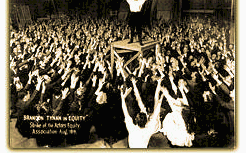 Actors rally for the strike of 1919 (Photo Credit: Library of Congress)
February
Unwittingly prophesying the growing corporate culture on Broadway, Editorial in Equity views "with some misgivings the proposed merger between the Erlanger and Shubert producing organizations "... It is too much power to trust with one man or one small group of men...(A) merger is formed of stockholders who are interested, not in art, but in dividends." In the spring, the managers create a new organization: the Producing Managers' Association. In June, the PMA announces that it will not recognize Equity. July 1
Equity's contract with producers expires. Equity demands recognition from management, better rehearsal pay, an eight performance week, holiday and Sunday pay. Producers resist. Tensions mount.
July 18
White Rats agree to give up their charter, allowing the AF of L to create the Associated Actors and Artistes of America (the 4As), the body through which all the professional performer unions are affiliated with organized labor. Its first charter is granted to Equity. For the majority of Equity members, affiliation with the AF of L is no longer a question. As Frank Gillmore says: "Why should the actor hesitate? Is it professional false pride or stupidity, or empty-headed vanity? Ours is not a profession. It isn't even a trade. It hasn't even the dignity of a vocation. It's only a job! And half the time we don't get paid for it!"
July 22
Vaudeville impresario E.F. Albee tells the PMA the only solution to this struggle is to crush AEA. He suggests attacking the reputations of the union leaders, creating a rival organization and showering those who join it with huge salaries. |
August 1
1,500 Equity members meet at the Hotel Astor. They pledge continued allegiance to AEA, the AF of L and the 4As. August 7
Following an afternoon meeting at the Hotel Astor, a resolution is adopted that unless AEA is recognized and the contract adopted, no member will work for any manager in the PMA. 1,200 new members join today.
August 9
The United Scenic Artists' Local Union expresses support for AEA. August 12
The beginning of Chorus Equity: Florenz Ziegfeld reveals that he has joined the Producing Managers' Association. The girls in his Follies chorus create Chorus Equity with the help of a $100,000 donation from Lillian Russell. Marie Dressler, a former chorus girl who became a leading performer, is elected the first president. In Chicago, the Cohan Grand Opera House and the Cort Theatre are forced to close. August 13
Emboldened by the creation of Chorus Equity, many of the performers, including Eddie Cantor, refuse to go on at the Amsterdam Theatre, and the Follies is closed down. August 14
The Theatrical Mechanics Union assures support. 1,700 new members have joined both the Actors' and Chorus unions. August 17
All Chicago theatres are closed. August 18
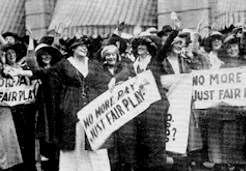 Marie Dressler and Ethel Barrymore during the 1919 strike A week of benefit performances at the Lexington Avenue Opera House is kicked off with a parade from Columbus Avenue to Madison Square. W.C. Fields is the emcee. Eddie Cantor, Marie Dressler, Ethel and Lionel Barrymore are among the performers. At one point, Ed Wynn stands up in the audience. A judge has forbidden him from appearing on stage, he explains, but "if I could have appeared on the stage, this is what I would have told you..." He goes on to describe the conflict, paraphrasing Marc Antony's speech from Julius Caesar to wild applause. August 20
The anti-union union: The Fidelity League is formed. Cohan promises $100,000 for financing as soon as he resigns from PMA. August 22
Huge meeting today of Equity members at the Lexington Theatre. $21,500 is raised for the union. Meeting is addressed by Helen Keller, who has herself worked in vaudeville. |
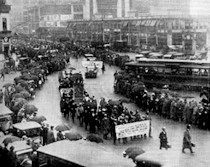 Stage Hand's Section marching down Columbus Circle, NY August 23
More theatres in New York close; the total is now 21. August 24
George M. Cohan becomes president of the Actors Fidelity League. Equity members call it "Fido" for short. August 26
Richard Rodgers and Lorenz Hart are launched professionally when A Lonely Romeo features one of their songs. The show had been exempt from the strike because the producer is not a member of the PMA. But when it is discovered that the Shuberts are a silent partner in the show, the production is shut down. American Federation of Labor President Samuel Gompers, just back from Paris where he had led the Labor delegation for the U.S. at the Peace Conference, tells Equity members, "Whatever influence or power there may be in the great American Federation of Labor to help you, rest assured that power and influence is behind you until the end." August 28
$37,000 is refunded to 6,000 audience members after the Hippodrome is closed by the Teamsters. The Belasco Theatre in Washington, D.C. is closed. AEA Ball in New York nets $17,000 for union coffers. August 29
Equity members in Boston vote to strike. September 1
Large benefit performance at Chicago's Auditorium Theatre. September 2
The producers say they will give in to all demands except the "Equity Shop" clause - the principle of not restricting management in its choice of actors, but if cast, actors had to become Equity members. September 3
Equity decides not to hold out for the closed shop. 500 new Equity members have joined in the past three days. September 5
Producers and Equity meet. All appropriate unions and the AF of L are represented. The Fidelity League is not. September 6
After 30 days, 37 closed productions, 16 prevented openings, and a loss of $3 million, the strike is settled at 3 AM: managers sign a five-year contract. Equity is recognized and conditions will improve. George M. Cohan never signed an Equity contract. He was allowed to work in professional productions with a special, and some would say generous, dispensation from Equity. Before the 1919 strike, Equity had 2,777 members. After the strike, it had grown to 14,000. Oh, and the Senate fails to ratify the League of Nations, Prohibition becomes the law of the land, and Germany creates the democratic Weimar Republic. Next 1920's... |
||
| to timeline introduction... | ||||
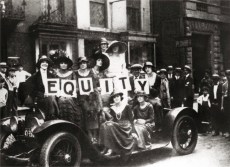
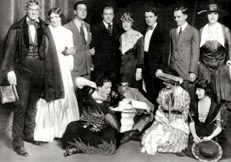
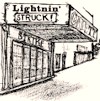 That evening, the casts of 12 shows refuse to go on. Frank Bacon, writer and star of the show Lightnin' said, "I'm an actor, author and manager...but when this strike began, my wife said, 'We'll stick to our own people. I can still cook on a one-burner coal-oil stove, if necessary.' So we're sticking." The cast hired a bus draped with a banner reading "Lightnin' Struck!"
That evening, the casts of 12 shows refuse to go on. Frank Bacon, writer and star of the show Lightnin' said, "I'm an actor, author and manager...but when this strike began, my wife said, 'We'll stick to our own people. I can still cook on a one-burner coal-oil stove, if necessary.' So we're sticking." The cast hired a bus draped with a banner reading "Lightnin' Struck!"